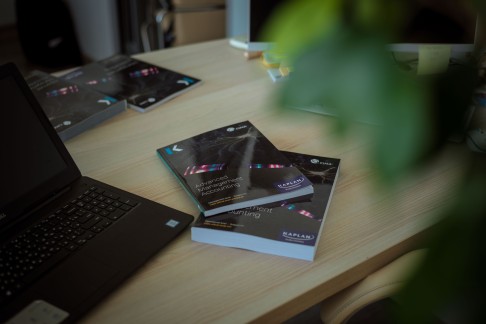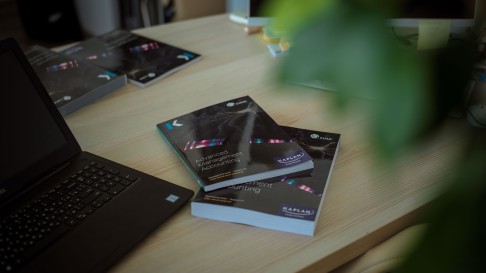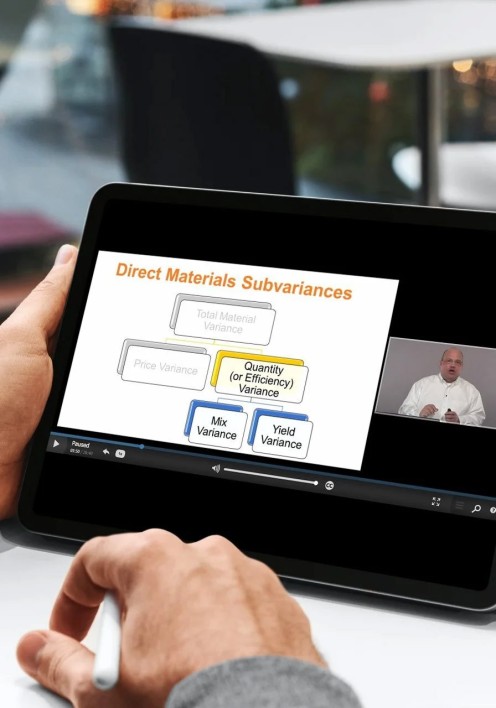The program will develop skills in using financial and non-financial information for management decision-making. It covers key aspects of organizational performance management relevant to doing business anywhere in the world!
CIMA DipPM qualification is designed for financial professionals developing their careers in management accounting and reporting, budgeting and planning, corporate finance management (Treasury employees), for professionals whose work is related to the financial analysis of the company's activities, as well as managers of other functional units that accept participation in making management decisions related to investments, planning and implementation of projects, budgetary control, etc.
The CIMA Diploma in Performance Management program includes 2 modules: "Management Accounting (P1)" and "Advanced Management Accounting (P2)". To obtain the DipPM Diploma, students will need to pass two challenging exams in English: P1 and P2.
CIMA P1 stresses the importance of costs and the drivers of costs in the production, analysis and use of information for decision making in organisations. The time focus of P1 is the short term. It covers budgeting as a means of shortterm planning to execute the strategy of organisations. In addition it provides competencies on how to analyse information on costs, volumes and prices to take short-term decisions on products and services and to develop an understanding on the impact of risk to these decisions. P1 provides the foundation for cost management and the long-term decisions covered in P2.
Focusing primarily on the long term, CIMA P2 builds on the insights about costs and their drivers (from P1) to provide the competencies needed to analyse, plan and manage costs to support the implementation of the organisation’s strategy. It shows how to manage and control the performance of various units of the organisation in line with both short-term budgets and long-term strategy. Finally, P2 covers investment decision making and the risks associated with such decisions. It provides the basis for developing deeper understanding of various types of risk affecting the strategy and operations of organisations.
Graduates of the program, who have achieved the required number of points and successfully passed the exams P1 and P2, receive a certificate and become owners of the status of CIMA DipPM.
The purporse of the programm is developing the skills to make effective management decisions using the full range of financial and non-financial information. You will learn on the program to:

The P1 course program covers the following topics: cost accounting systems - 30%, budget and budgetary control - 25%, short term decision making - 30%, dealing with uncertainty in the short term - 15%.
Duration: 9 lessons (72 a.h.)
Lesson 1. Principle of the absorption costing. Principles of the marginal (or variable) accounting method. Profit reconciliation. Activity-based costing ABC. Joint production cost accounting. Theory of constraints and throughput accounting. Digital cost accounting.
Lesson 2. Standard costing method. Establishing standards for the service industry. Accounting for basic variance.
Lesson 3. Cost variance by mix and material yield. Cost variance by assortment and quantity of sales. Planned and operational variances. Interpretation of variances. Models of variance research.
Lesson 4. Budgeting for performance measurement. Production budgets. Cash budgets. Flexible budgets.
Lesson 5. Big data. Scenario planning and stress testing of budgets. Budgeting for planning purposes. Linear regression analysis. Time series. Detection and anticipatory control.
Lesson 6. Relevant costs. Short-term decision making. Breakeven analysis for a single product and for a multi-product line. Limitations of break-even analysis.
Lesson 7. Analyzing limiting factors. Shadow price. Linear programming: graphical method.
Lesson 8. Risk and uncertainty. Probability distribution. Decision tree. Standard variance. Criteria of maximax, maximin and minimax regret. Sensitivity analysis.
Lesson 9. Mock exam. Review of all topics of the course.
The P2 course program covers the following topics: managing costs - 25%, capital investment decision making - 30%, managing performance of organisational units - 30%, risk and control - 15%.
Duration: 9 lessons (72 a.h.)
Lesson 1. Cost Transformation. Activity Based Management (ABM). Direct product profitability (DPP), and customer profitability (CPA). Profitability of sales channels. Pareto analysis.
Lesson 2. JIT manufacturing strategy. Total Quality Management (TQM). Kaizen cost accounting method. Business process reengineering (BPR). Supply chain management. Outsourcing. Target costing. Cost and functional analysis. Porter's value chains. Learning curves.
Lesson 3. Business intelligence systems. Data sources for decision making. Investment decision making process. Payback period (PB). Accounting rate of return (ARR) method. Net Present Value (NPV) method. Internal rate of return (IRR and MIRR) methods. Discounted payback period (DPB).
Lesson 4. Normed capital and profitability index (PI). Sensitivity analysis and taxes. Mutually exclusive investment projects. Asset substitution.Real options.
Lesson 5. Demand elasticity. Mathematical models of profit maximization. Cost-plus pricing. Pricing strategies for new products. Price discrimination.
Lesson 6. Financial performance indicators. Return on investment (ROI, ROCE). Residual income (RI). Economic value added (EVA). Non-financial performance indicators. Balanced scorecard. Benchmarking.
Lesson 7. Transfer pricing methods. Perfect and imperfect markets. Transfer prices on the basis of agreements. International transfer pricing.
Lesson 8. Sensitivity Analysis. Using standard variance to measure risk, perfect and imperfect information. Corporate social responsibility. Information systems and the risks of their use, BIG DATA.
Session 9. Mock exam. Review of all course topics.
CIMA Tutor since 2013. Finalist of CIMA ENGAGE EUROPE Finance Awards 2021 in "the Tutor of the Year" nomination (top-7). Vasiliy has extensive tutoring experience and also teaches courses in Financial Management, IFRS, Enterprise Finance, Business Planning at the MBA programme. He supervises MBA business planning master's dissertations in Russian and English. Vasily has worked in retail, finance and consultancy in large companies.

Lessons are conducted ONLINE in real time on the ZOOM platform. Trainees can communicate with the tutor and colleagues and ask clarifying questions during the training. A virtual whiteboard is used to demonstrate calculations, graphs and diagrams during each lesson. A presentation with the main ideas of each topic is shown. Study materials, practical tasks and tests, CIMA books are provided. After the lesson all participants receive a video recording of the lesson and an informative and comprehensive notes from the tutor. The training process includes testing on each topic to consolidate the material covered and to practice solving exam tasks. Each student is given access to a personal account of the learning system with the ability to monitor progress.
CIMA training in Georgia. Courses, test, exam, qualification, certificate | HOCK

Students will need to pass two exams - P1 "Management Accounting" and P2 "Advanced Management Accounting". Candidates take the exams in English online or in authorized Pearson VUE centers in a computer-based testing format. CIMA P1 and P2 exams are available on demand throughout the year. The tests contains 60 questions, including multiple choice short questions, number-filling questions, and other formats. Exam duration: 90 min. Pass mark - 100 out of 150. Registration for the exams is through an accredited CIMA Dip PM programm provider.

graduates will receive the designation CIMA Dip PM along with their diploma. Students who successfully complete the CIMA Diploma in Performance Management can progress straight to the Management Case Study level (subject to additional fee). After passing the Management Case Study exam students will gain the CIMA Adv Dip MA designation as well as their paper diploma. Students can then progress to the Strategic level of the CIMA Professional Qualification.


That you will get by applying for CIMA courses at Hock International: